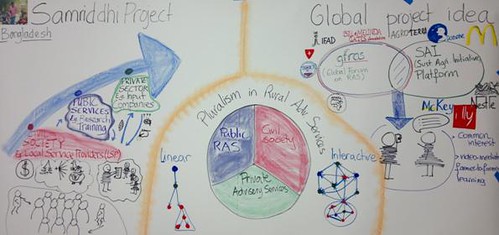The 'river of life' drawing above was completed by the green cards in the course of the session and served as a storyline for the thematic input by Marylaure Crettaz (Swiss Agency for Development and Cooperation) and Nara Weigel (HELVETAS Swiss Intercooperation). The story started in the mountains with a personal reflection of Marylaure and continued with a brief introduction of SDC's interest in Rural Advisory Services (RAS) most recently expressed through providing support to the GFRAS (Global Forum on Rural Advisory Services). SDC's reorganisation including the creation of thematic networks - one of them being the Agriculture + Rural development network open to SDC staff and its partners - was illustrated as a bend in the river! The network has been capitalizing RAS experiences. This led to the presentation of two initiatives one at project level in Bangladesh and the other at a global level - where public private partnerships were at the core. See below for an illustration of the key actors involved.
The presentation served as a basis to subsequent discussions in a world cafe format on (1) the added value of public private partnerships - at project and global levels for the farmers and (2) whether private sector involvement at both levels leads to more sustainability. Participants agreed that the success of public private partnerships depends very much on the context. Nevertheless, most participants feel that private sector involvement can lead to new market opportunities for farmers as well as more efficient and relevant services, e.g. through facilitating a better flow of information. Under certain conditions (i.e. social inclusion) this can lead to improved livelihood opportunities. It was also highlighted that the role of the public sector remains crucial regarding quality control and setting enabling environments and policies. Finally, participants pointed out that civil society is an important actor, e.g. farmers as drivers of change and NGOs as facilitators. Nothing new under the sun of Rome. ;-)



No comments:
Post a Comment